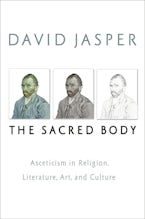A beautiful, even inspired, book that weaves through art, literature, Scripture, and philosophy.
~David E. Klemm, Professor of Modern Religious Thought, The University of Iowa
This deeply serious meditation contains fresh, often dazzling, interpretations of classical literature and painting. Quintessential Jasper--his best book yet.
~George Newlands, Professor of Divinity, University of Glasgow
One of our most challenging and imaginative thinkers here goes well beyond his previous important work and gives us an incredibly comprehensive analysis. Jasper understands the sacred desert critically, philosophically, and theologically at once, even while embodying that desert in a genuinely mystical meditation. In The Sacred Body desert becomes cosmos itself, as we are consumed in its unfolding, and are summoned to become what we behold.
~Thomas J. J. Altizer, Author of Godhead and the Nothing, and Living the Death of God
... heartily recommended for readers interested in intellectual and spiritual exploration.
~Eugene Webb, University of Washington, Christianity and Literature
David Jasper is a mighty theologian, and this short book... represents a serious, dense, and powerful contribution to contemporary theology--strong medicine indeed.... It is certainly a book that demands a second reading, and perhaps many more.
~Church Times
[Jasper's] ability to draw the expected and unexpected partner into a conversation on the ascetic body is no mere clever or playful attempt to 'convince,' rather he invites the reader into the conversation to become part of the pursuit of a possibility for theology today.
~Paul M. Collins, University of Chidester, The Journal of Theological Studies
As an author, Jasper is not ashamed to bare his own life before the reader's eyes. His method is refreshingly frank in its idiosyncrasy: personal anecdotes are common, the personal pronoun is abundant, and the book as a whole has an artful, syncopated quality.
~Christian Scholar's Review
…a moderate, eirenic and thoughtful study, which seeks to demonstrate that struggling with Christian tradition can be productive and even lead to 'genius.'
~Alison Milbank, Modern Believing

